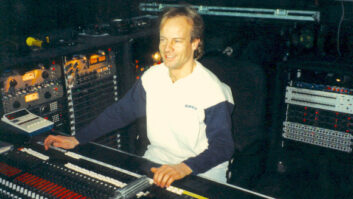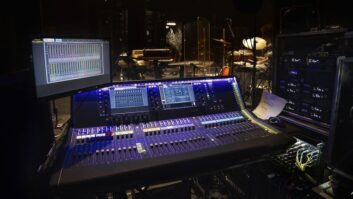Microsoft Corp. (NASDAQ=MSFT) announced today a change in the release schedule of its new operating system, Windows 2000, explaining that extra time was needed to bring it into full Y2K compliance. The release date is now expected to be second quarter 1901.
-an alleged Microsoft press release, circulating the Net
Date: April 1, 2000
From: Insider Audio Central
City: None of your business
Well, it’s been quite the few months since the big year-o-metric tickover, hasn’t it? Nothing happened as anyone predicted it would, at least not in the way they predicted, but a whole lot of things happened that no one expected. And our little industry wasn’t unaffected, was it?
There were, of course, the great shortages and outages, as the doomsayers predicted. But the doomsayers got them right for all the wrong reasons. The technology didn’t fail us: We managed to screw things up all by ourselves, just by expecting that the world was going to end.
Were you one of the millions who woke up the day after Christmas and decided you’d better fill your cars’ fuel tanks, figuring all the pumps would stop working a week later? Actually, none of the pumps had clocks in them, but that didn’t stop you from getting into one of those gas lines that made the ’70s oil panic look like a picnic on a deserted beach. Prices soared, Exxon and Mobil called off their merger as their individual stock prices went through the roof, troops went on alert in the Persian Gulf, and Nigerian investment capital, of which there suddenly seemed to be a whole lot, bought out what was left of the Republican party. Three tanker ships, trying to make double-speed deliveries with crews forced into round-the-clock duty, went aground off of Nova Scotia, causing spills that closed down the entire New England fishing industry once and for all, and suddenly scrod, which no one outside of Massachusetts had even heard of before, became a prized delicacy among the only folks who could now afford it: Silicon Valley Internet startups. While Boston fish markets were reduced to selling canned Japanese tuna, you could find all the scrod you wanted at Palo Alto sushi bars, at $600 per piece.
Or were you one of those who nearly precipitated an international banking crisis on December 30, when you decided you had to get all of your savings into a safe place, like under your mattress, and stormed your local ATM? When the cash supply dried up, an obscure piece of code in bank machines programmed by a certain Seattle-area company kicked in that caused the ATMs to actually print new currency. However, instead of Andrew Jackson’s picture on the $20s, there was a holographic engraving of Bill Gates. Although most people didn’t notice the difference (after all, they’d been dealing with weird-looking $20s for a while), there was enough of an outcry to cause deep concern at the Federal Reserve Board, and several Texas Savings and Loans teetered once again on the verge of extinction. But calm prevailed when it was announced the bills (or “Willies,” as we now call them) would be accepted at 100% of face value at all Starbucks.
Then there was the afternoon of December 31, when the “Super Bowl Halftime Effect,” which until then had been considered an urban myth, became reality. But instead of all of America flushing their toilets at the same time, at 6:30 p.m. Eastern Standard Time, just as all three networks’ nightly news led off reporting that unemployed persecutor Ken Starr had filed his 422nd sexual-harassment suit against Bill Clinton (this one involving an airline flight attendant who claimed he pinched her buttocks on a flight to England at the start of his Rhodes scholarship), approximately 92 million households simultaneously decided this would be a good time to turn off their TVs and start filling every empty bucket, jug, bottle and bathtub in their house with water, in anticipation of the nation’s water system breaking down. Of course, that precipitated the very event it was supposed to mitigate, and the resulting loss in pressure caused cooling failures and emergency shutdowns at several major nuclear-powered electric plants, thereby throwing large chunks of the North American power grid into blackness, and all three networks off the air.
The madness wasn’t confined to our shores, of course. A couple of hours later, as midnight came to the Middle East, some 200 white-robed, blond-haired individuals appeared on hilltops overlooking the city of Jerusalem, each claiming to be the Messiah, come again to redeem humankind. Upon spotting each other, these individuals at first tossed insults, then began invoking divine wrath upon each other, and when that failed to have any effect, they resorted to hair-pulling, fisticuffs, and eventually stone-throwing. Local police, who fortunately were stationed close by collecting firearms and explosives from thousands of smiling pilgrims to the Holy Land, quickly quelled the altercations and arranged for the wackos to be deported back to the U.S. Today, of course, their talk shows fill Fox’s afternoon schedule, which those of us with battery-powered televisions can enjoy.
Finally, at midnight in New York, the 30 million who called the recorded telephone time lady to hear the year officially tick over not only got busy signals, they caused a voltage spike that erased James Earl Jones’ voice from thousands of Bell Atlantic announcement chips, thus invoking a $100 billion severance clause buried deep in Jones’ 214-page endorsement contract, immediately driving the not-so-Baby Bell into insolvency.
Those of us who still had electricity witnessed the spectacle of the Internet being brought to its knees, as a reported 65 million Web surfers tried to watch the AOL-exclusive live Webcast of Dick Clark riding the light ball down the TV transmitting tower atop the World Trade Center. Because of the overload, almost nobody saw Clark’s panic attack, which climaxed in his screaming, “I don’t care what century it is, I’m still a teenager!” and his subsequent rescue by a TV station helicopter.
Since that date, which has come to be known as “ECAWKI”-the End of Civilization As We Know It, pronounced “iee-kaw-keei”-the professional audio industry has been confronted with some of the biggest challenges in its short history.
Home and project studios-which, because they typically couldn’t afford floating floors and double-studding have always had to deal with the problems of ambient noise-were hit particularly hard by ECAWKI. The wood-powered electric generators they now have to rely on typically raise the noise floor in the control room/studio to 98 dB SPL. Many project studio owners are solving this problem by building “generator cellars,” and a few, especially in the suburbs, are lucky enough to have old ’50s bomb shelters in their yards, which proved perfect for this function. These cellars have the added bonus of protecting the unit from acquisitive and probably hungry neighbors.
Another problem faced by small-studio owners has been a sudden increase in competition from large numbers of new entrants into the field. These newbies, all former white-collar frustrated rock stars, found themselves with huge windfalls when the companies they worked for, all of whom used personnel-maintenance software designed in the ’70s by Ross Perot, received computer-generated letters informing them they had due them 100 years’ worth of back vacation pay. The letters offered them up to 30 years paid vacation or a one-time payment, which in many cases exceeded $8,000,000. Naturally, many chose the latter and cashed out before their payroll departments knew what hit them. After they bought the Lexus and the Ford Explorer, their attention turned to fulfilling their adolescent rock ‘n’ roll dreams, and digital consoles, multitracks, copies of vintage guitars, and overpowered monitors started flying out of dealers’ warehouses. While this burgeoning market has been a boon to manufacturers and sellers of pro audio gear, ironically very few employees of those companies benefited from this particular Y2K bug, since almost no one in those industries ever sticks with a company long enough to accrue any vacation time at all.
A number of companies have managed to bring to market, remarkably quickly, new products that are well- adapted to our post-ECAWKI world. Alesis Corporation, long known for providing useful new technology at rock-bottom prices, has had great success with its “true digital” 1-bit recording device, known as “Sucaba.” It achieves economies by relying on finger power (hence, “true digital”) and offline storage (when you get a number, write it down). Its continuously adjustable sample rate is not reliant on AC line frequency or voltage, which is particularly helpful in areas where there isn’t any. Religious groups at first objected to the name and picketed Alesis’ headquarters with signs saying “Stop the Spawn of the Devil” and “If God had wanted us to record digitally he would have had our fingers coming out of our ears,” but they quietly went away when it was pointed out to them “Sucaba” was merely “abacus” spelled backwards.
A small company in the south of England has a hit with its model “Fred,” a unique “power-independent” amplifier that is being snapped up by both studios and sound reinforcement companies as fast as the assembly line can turn them out. It features a massive cooling system with two large squirrel-cage fans, but no AC plug or even a battery pack. The secret is that the squirrel cages are indeed just that, and the unit ships with two healthy young squirrels, one male and one female, whose constant running, motivated by their reproductive imperatives and a supply of peanuts, provides a continuous, although somewhat erratic, source of current to the amp’s power supply-enough to drive a pair of 4-ohm speakers to levels sufficient to drown out the noise of the unit itself. The company now plans to offer a slightly smaller, more portable version that uses hamsters, which will be called “Barney,” as well as models for the domestic hi-fi market, “Wilma” and “Betty.”
Casio has come back into the professional products arena with the first DAT machine that uses neither AC power or batteries. The users’ manual, produced entirely on an old Underwood typewriter, explains that an “angular motion storage and retrieval device” must be engaged prior to operating the unit, and users are then to “release the energy reserve drive mechanism” when they want to Record or Play-in other words, a wind-up crank and a spring. The only problem users have been complaining about is that the device can’t be used indoors, since it needs bright sunlight to operate the D/A converters, but since no one has any indoor lighting anyway, this is not as much of a drawback as one might think.
One group that has made out exceptionally well in the last few months is exporters of pro audio gear to the Third World. Orders from China, the Arab nations and Israel for computer-based DAWs soared in the final weeks of 1999 and have continued high since then. Companies in those countries that no one ever heard of suddenly had lines of credit worth millions, and they were snatching up Mac, Wintel and stand-alone systems like it was, well, the end of the world. At the same time, major recording studios opened up or beefed up their overseas operations and started shipping large numbers of personnel to these outposts.
The reasoning behind these extraordinary moves became clear when a disgruntled employee of Seagram’s (now owner of all 18 remaining major record labels) leaked an internal confidential memo: “How to set your computer’s clock to local time.” Prominent in the text were instructions for setting the year to conform with non-Christian calendars: In Moslem countries it is 1421, which pushes the Y2K problem far off into the future, while in Israel and China, where the current years are, respectively, 5761 and 4698 (since February), the problem went away centuries ago.
So systems are working and people are living their lives as they always have, wherever they haven’t gotten hung up on all of those zeroes, and on a calendar that was four years off from the day it was created. It’s only in our part of the world, where we boast of being rational, scientific and technologically mature, that society has been brought to its knees by the power that, in our imaginations, numbers hold over us.
Only in this “advanced” civilization can the fears of the technology that we have created utterly negate all of the knowledge it has allowed us to accrue. Only here can the hucksters, screaming loudly that the end of the world is nigh while they scurry about finding ways to cash in on the terror they create, actually bring it about themselves. As the immortal bard Pogo Possum might have said, had he lived into this last year of the 20th century, “we have met the Y2K problem, and he is us.”







